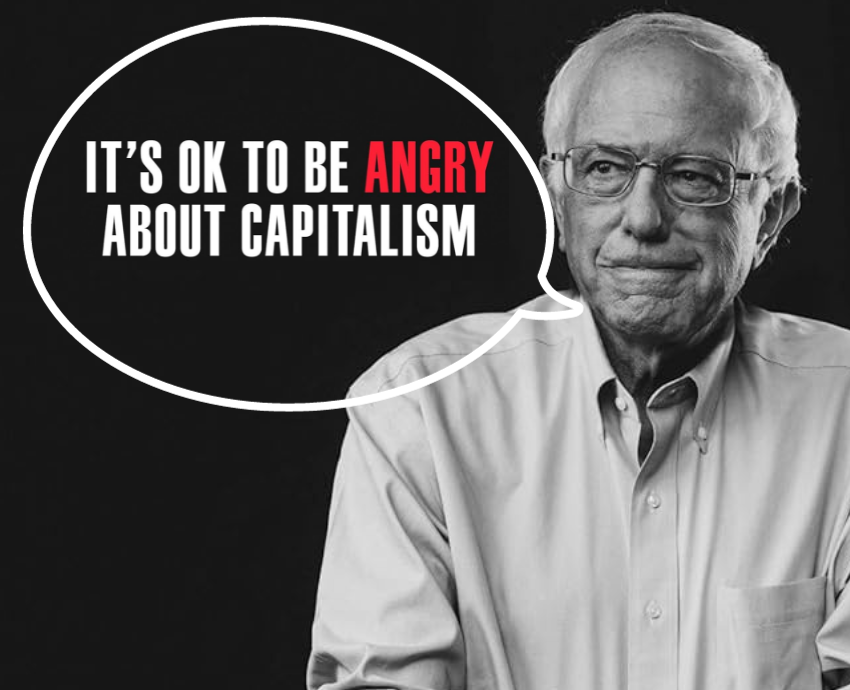
It’s Ok to be Angry about Capitalism
By Bernie Sanders
London: Allen Lane publishing (Penguin books), 2023
293pp
“They say that the older you get, the more conservative you become. Well, that’s not me. The older I get, the angrier I become about the uber-Capitalist system under which we live, and the more I want to see transformational change in our country.”
This is how Bernie Sanders, United States independent senator for Vermont and two-time primary challenger for the Democratic nomination for president, responds to the idea that the older someone gets, the more conservative they become.
Instead, Sanders calls out the system that is rigged in favour of the capitalist class, leaving everyone else struggling to survive, in his 2023 book, It’s Ok to be Angry about Capitalism.
During the escalating COVID-19 pandemic in 2020, Sanders announced the end of his campaign for the Democratic presidential nomination. Building on his 2016 campaign, which almost unseated rival nominee Hilary Clinton, Sanders inspired millions of people to take on the political establishment.
Sanders, who previously authored Our Revolution (2016) and Where We Go From Here (2018), brings to light the stark inequality that plagues US society, where 0.1% of the population own 90% of the wealth and where, during the COVID-19 pandemic, the wealth of 725 US billionaires rose by 70% to more than US$5 trillion. Today, the “Big Three” investment firms BlackRock, Vanguard and State Street now control assets of US$20 trillion and are major shareholders in 96% of S&P 500 companies.
Concentrating on the issues of wealth inequality, unemployment, corporate power, climate change, workers’ rights, income concentration and access to health and education, Sanders’ 2020 campaign mobilised thousands of ordinary Americans — especially young people, women and Latino voters — and he won six primaries, including in California and Nevada.
Among the Latino community, Sanders campaigned around the issue of Medicare for All, free college tuition and immigration reform. He opened offices in Latino neighbourhoods, canvassed Latino homes and supermarkets, printed materials in Spanish, and got his message into Latino media.
This effort paid dividends as Sanders won over Latino voters with 53% in Nevada compared to rival nominee Joe Biden’s 17%, 49% in California compared to Biden’s 19%, and 39% in Texas compared with 26% for Biden.
Another success of Sanders’ campaign was that it raised $45 million, with the average donation being $18.50, in an election fundraising environment dominated by corporate donations and Super Political Action Committees (SuperPACs).
Sanders was briefly being the primary frontrunner, in February, 2020. However, by March 3 (“Super Tuesday”), the Democratic party and corporate establishment swung behind Biden. Sanders’ campaign never recovered from this setback and on April 8, Sanders suspended his campaign and urged people to support Biden to defeat far-right incumbent Donald Trump.
Biden defeated Trump in November 2020, while the COVID-19 pandemic raged, and on the back of the Black Lives Matter protests that arose after the police murder of George Floyd.
Following the election, Trump and his supporters spread conspiracy theories about the election that led to the January 6, 2021 insurrection.
Despite Sanders’ defeat at the primaries, his campaign extracted some major concessions from the Biden campaign, such as the American Rescue Plan, which passed in March, 2021 and provided direct government payments to struggling families and prevented evictions during the COVID-19 pandemic.
Towards the end of It’s Ok To Be Angry About Capitalism, Sanders details how the Democratic party was captured by the corporate elite during the Bill Clinton era in 1990s. In his view, the party’s refusal to espouse a working-class politics that targets the corporate elite has cultivated a politics of grievance, where white working-class people scapegoat women, immigrants, Blacks, Muslims, Queer and Transgender people, teachers and union leaders for the system’s failures.
Sanders argues that the Democrats should adopt a clear working-class politics that taxes the billionaire class to fund Medicare for all, free college education, a $15-an-hour minimum wage and a Green New Deal.
Sanders refers to US billionaires as “oligarchs”, writing: “the oligarchs run Russia. But guess what? Oligarchs run the United States as well. And it’s not just the United States, it’s not just Russia; Europe, the UK, all over the world, we’re seeing a small number of incredibly wealthy people running things in their favor. A global oligarchy. This is an issue that needs to be talked about.”
While Sanders advocates restricting the power of the capitalist class and organising to make people’s lives better, he argues that “uber- or hyper-capitalism” is the problem, rather than the system of capitalism itself — which puts profits ahead over everything else. There is no such thing as “good” capitalism.
However, despite this weakness, It’s Ok to be Angry About Capitalism is worth reading. It shows how Sanders’ 2016 and 2020 campaigns offered a political alternative to the Democratic establishment and its pro-corporate centrism, in the era of Trump and the Republican party’s far-right politics.
More importantly, in a world facing climate catastrophe, the rise of the far right and continued economic crisis, Sanders has shown the importance of not just getting angry, but organising for a politics that identifies as Socialist and gives people hope of a genuine alternative.